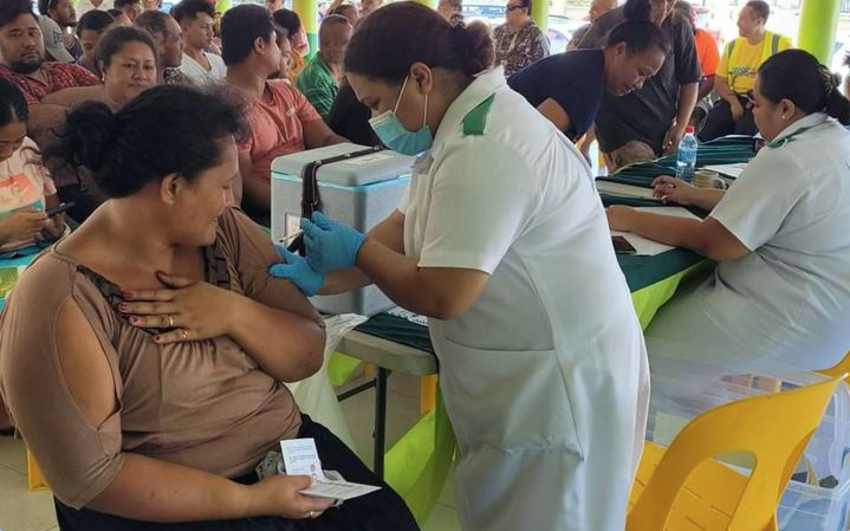The reason the Pacific is not being vaccinated

‘It is critical for donor countries to see the bigger picture, to see that this really is a time not to profit, but to be stepping up to support all countries to come through this…. the vaccine needs to be a gift to the world.” - Helen Clark, former Prime Minister of New Zealand & former United Nations Development Administrator
* Cover image Samoa vaccination Drive via Radio New Zealand
-
It's the same old - haves and have nots - story. Only this time it stars ‘The Vaccine’.
The plot; Wealthy nations hustle to get their citizens vaccinated, while the poorer countries are left to feed off the scraps of vaccine donations.
The only problem is, this isn’t a movie. It’s real life and the reality is vaccines are expensive and not easily accessible. Especially for the smaller countries in the Pacific.
This is what has been discussed (not the fake movie, the reality) at this week’s Council for International Developments' annual conference and former NZ Prime Minister Helen Clark wasn’t holding back on her criticism, calling on donor countries to urgently step up the supply of vaccines to poorer countries. A position she is well equipped to take as the current joint lead in to the investigation of the W.H.O. And governments response to Covid-19.

Also attending the conference was - NZ’s former bubble buddy - Cook Islands Prime Minister Mark Brown and Samoa’s Prime Minister Fiamē Naomi Mata’afa - whose country’s current vaccination rates are 94.8% first vaccinations and 64.5% fully vaccinated, putting them behind their goal of 98% full vaccinations before they will safely re-open to the world.
According to Helen Clark, the Pacific is seeing ‘vaccine poverty’ on the same level as some African countries and it’s because the rich nations are hoarding vaccines.
“High income countries have ordered twice as many vaccines as they need and this needs to be redistributed. The critical case in our region right now is Papua New Guinea. The level of vaccination here is on a par with the least vaccinated in Sub Saharan Africa. This is shocking”
According to Bloomberg News Outlet: Canada, The U.K. and Australia have enough vaccine reserves to vaccinate each of their populations several times over. The 52 least wealthy nations (many Pacific nations included) only have access to 4.3% of all total vaccine reserves.

“A superior attitude taken by donors of ‘we know best’ will not yield the desired lasting results,” said Prime Minister Mark Brown.
Donor driven approaches seldom address the needs of the recipient partners if the driver is geo-politics not development, he added.
Helen Clark also called for TRIPS (‘Trade-Related Aspects of Intellectual Property Rights’ - a multilateral treaty that includes copyright provisions) to be waived as a point of principle, during Covid and any future pandemics, to make vaccines cheaper and more available in poorer countries.
The implications of not having fully vaccinated populations in the pacific could be catastrophic for both society and culture, but it seems when it comes to Covid vaccinations, not all people are created equal and because of that, nobody is safe.
“We’ve heard the saying all through Covid - ‘none of us are safe until all of us are safe’ - and haven’t we seen that in our own country? The same is true globally. If we let the disease run away in poor countries, we will not get on top of Covid,” said Helen Clark.

So the big question, yet to be answered, is which countries are willing to loosen their grip on their reserves and will step up and donate some of their excess vaccines to help make the world and the pacific a safer place?
Samoa has been signed up to aid effectiveness and climate change agreements for many years to ensure its voice is heard, said Prime Minister Fiamē.
“(Aid relationships) were not always in our interests. From concept to implementation of programmes, our views were only fleeting comma stops, our priorities often lost in whirring scenarios,” she said
“Our efforts to build back better (after Covid) must be greater than the sum of their parts. Diverse stakeholders must work in harmony and synergy to share complimentary knowledge and experience.”
The Prime Ministers identified key ways in which aid and development post Covid, could have real impact:
Increase collaboration across sectors, and include the private sector in the Pacific as the key engine of growth, said Prime Minister Fiamē
Support the strengthening of local systems and governance – then ‘where those systems are robust, there is no excuse not to use them,’ said Prime Minister Mark Brown
Provide flexibility in funding mechanisms, particularly during cyclone season, to facilitate access to local actors. Make sure actors, particularly Non-Government-Organisations are well represented at all stages of development and humanitarian responses.

“Covid continues without an end in sight, and now the Pacific faces a cyclone season….but this is an important opportunity to further strengthen local humanitarian actors,” says Prime Minister Fiamē.
"Covid has only exacerbated fundamental cleavages in the delivery of aid to the Pacific. Left unaddressed, this will only hold back the region’s long term development,” says Prime Minister Mark Brown.
But Covid is our opportunity to put things right in the aid system, say the Pacific Prime Ministers.
Both Samoan Prime Minister Fiamē Naomi Mata’afa and Cook Islands Prime Minister Mark Brown thanked New Zealand for its support over many decades through the aid programme, but challenged all donors in the region to re-think how aid is designed and delivered.
